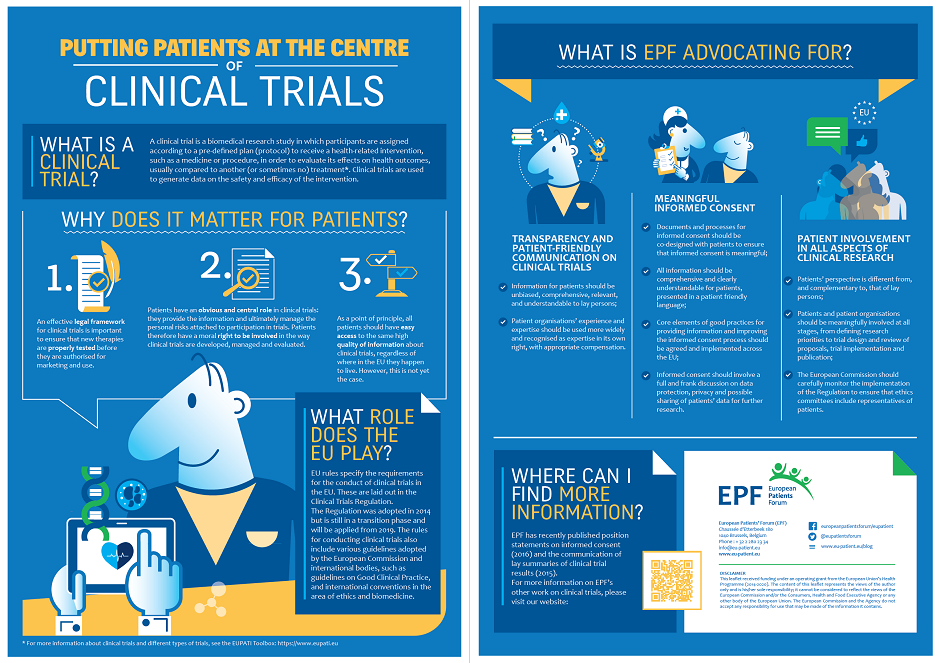Clinical Trials

General information
Clinical trials are investigations in humans intended to discover or verify the effects of one or more investigational medicinal products (Source).
The main legislative instrument laying down the requirements for the conduct of clinical trials in the EU is the Clinical Trials Directive (Directive 2001/20/EC). The Clinical Trials Directive is complemented by other Directives, such as the Good Clinical Practice Directive (Commission Directive 2005/28/EC ), and various guidelines adopted by the European Commission and international bodies.
In July 2012, the European commission presented its legislative proposal for a Regulation that will replace the clinical trials directive.
EPF’s Position
Clinical trials are an essential tool for developing new, and better, medicines and treatments to respond to unmet medical needs. The effectiveness of the clinical trials regulatory framework ultimately impacts patients’ access to new therapies throughout the EU, so it is of fundamental importance for our members.
EPF has been fully engaged in the process to revise the EU regulatory framework on clinical trials since 2009, when we contributed a strong cross-disease patients’ perspective to the impact assessment on the planned revision of the Clinical Trials Directive.
EPF was also actively involved in a working group at the European Medicines Agency on the application of ethical and good clinical practice (GCP) standards in third-country clinical trials in the context of EU marketing authorisation applications. The working group drafted a reflection paper, which was adopted by the agency and came into effect on 1 May 2012.
Our objective is to ensure that the new legislative framework at EU level is effective, proportionate, and patient-centred. We believe the review of the legislative framework presents an opportunity for reform towards more patients’ involvement throughout the research process; greater trust and public confidence in medical research; and improved participation rates.
EPF believes that for a genuinely patient-centred vision of clinical trials, five key issues need to be considered:
- Ensuring meaningful patients’ involvement across all aspects of clinical trials
- Giving patients access to quality information regarding clinical trials
- Meaningful informed consent
- Transparency concerning the results of clinical trials
- Access to treatments after the end of clinical trials.
Publications and initiatives
In September 2017, EPF issued a new policy factsheet on Clinical Trials explaining what clinical trials are, why this topic matters to patients, what the role of the EU is, and what EPF is advocating for. This document constitutes a compelling tool supporting EPF's advocacy work in conveying key messages in simple format for face-to-face meetings with policy makers and stakeholders.
In May 2016, EPF published its position statement on informed consent in clinical trials. The paper outlines our vision on this central issue for patients and stresses the importance of patient involvement. Read the paper here.
In August 2016, EPF contributed to a public consultation launched by the European Commission on the guidance for summary of clinical trial results. Read the response here.
Our 2015 position paper details how information on clinical trials should be communicated to be understandable to everyone as well as our recommendations on how an open, inclusive and accountable system can be achieved. Read the paper here.
June 2013
EPF welcomes the vote in the European Parliament on the legislative proposal for a Regulation on clinical trials.
May 2013
EPF is pleased to join the All Trials campaign in signing the petition requesting all clinical trial results to be reported.
Link to our statement: http://www.alltrials.net/supporters/european-patients-forum/
February 2013
EPF warmly welcomes the draft report of Glenis Willmott MEP (S&D, UK) and the European Commission’s legislative proposal for a clinical trial published on 31 January 2013.
Please find EPF Position Statement below.
July 2011
EPF held bilateral discussions with the Commission to exchange views on the revision. The dossier was discussed again in the Policy Advisory Group in September, and in a patients’ evidence workshop in November.
May 2011
The European Commission completed its second public consultation, to which EPF again gave a strong input. We submitted comments on the Commission’s proposals, as well as a statement raising again fundamental issues which were not addressed in the concept paper. This way we reiterated and expanded on the key principles that had already been voiced in our response to the first public consultation: more patient involvement in trials design and assessment; access to high-quality information; meaningful informed consent; and equitable access to treatment.
March 2011
We welcomed the launch of the EU Clinical Trial Register as we had long called for greater transparency around clinical research, including information about clinical trials taking place across the EU. The online register gives public access to information on interventional clinical trials for medicines authorised in the 27 EU Member States and Iceland, Liechtenstein and Norway. The database also allows the public to search for information on clinical trials authorised to be carried out outside the EU if these trials are part of a paediatric investigation plan. We will continue to support the European Medicines Agency through the Patients' and Consumers' Working Party, to ensure that the Register is developed further to meet the practical needs of patients.
January 2010
EPF responded to the Commission’s public consultation on the revision of the Clinical Trials Directive, based on a consultation of our members undertaken during 2009.
2009
EPF participated in impact assessment meetings with other patient and civil society groups during the Commission’s public consultation process.

